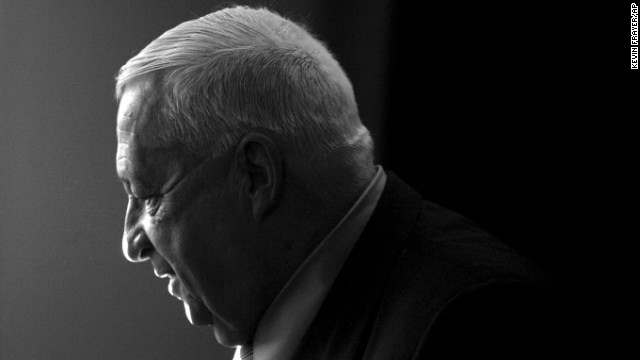Ariel Sharon: Hero or butcher? Five things to know
January 11, 2014 -- Updated 2050 GMT (0450 HKT)

STORY HIGHLIGHTS
Former Israeli Prime Minister Ariel Sharon is dead at 85
Sharon had been in coma for past 8 years after suffering massive stroke
Israelis saw him as war hero, but many in Arab world see him as a villain
(CNN) -- Ariel Sharon, the former Israeli prime minister who died Saturday at age 85, made a name for himself as a military and political leader who put Israel's security above all else.
It was a position that earned the controversial figure the nickname "the bulldozer" as a fearless leader who got things done.
To many Israelis, he was a hero. To some in the Arab world, he was a killer.
Here are five things to know about Sharon:
1. Some saw him as a war hero:
Sharon, who rose through the ranks of the Israeli Defense Forces, first gained hero status among Israelis during the 1967 Six Day War that saw Israel attack Egypt, Jordan and Syria to counter what they saw as an impending attack by the Arab nations.
Under Sharon's command, Israeli troops routed Egyptian forces during a nighttime battle to capture Um Cataf, a crucial crossroads in the Sinai. That victory is considered a major factor in Egypt's loss of the Sinai to Israel.
During the 1973 Yom Kippur War, Sharon earned the nickname "The Lion of God" among Israelis for surrounding Egypt's Third Army and, defying orders, leading 200 tanks and 5,000 men across the Suez Canal -- roughly 100 miles from Cairo.
Israelis mourned the death of Ariel Sharon
2. Others accused him of war crimes
During the Lebanon war in 1982, Sharon -- a former army general then serving as Israeli defense minister -- was held indirectly responsible by an Israeli inquiry in the 1983 massacre of Palestinians by a Lebanese Christian military at the Sabra and Shatila refugee camps.
The inquiry -- which led to Sharon's prompt resignation -- found he did nothing to stop Christian militiamen allied with Israel from entering the camps, despite fears they might seek to avenge the killing of their leader the previous day.
Many in the Arab world dubbed Sharon "the Butcher of Beirut," and Palestinians attempted to bring war crimes charges against him in European courts.
3. He made a provocative visit to an important mosque
Sharon long insisted that a controversial visit to the Al-Aqsa Mosque in Jerusalem, one of Islam's most holy sites, in 2000 was not a provocation.
But it is considered among many to be one of the flashpoints that sparked the Second Intifada, a Palestinian uprising that followed a failed round of peace talks with Israelis. During the visit, Sharon walked through the mosque's compound. Within hours, protests over his visit turned violent.
The mosque and its compound sits on Temple Mount, a holy site for Jews, that is known to Muslims as Haram al Sharif, "The Noble Sanctuary."
At the time, according to published reports, Sharon said his visit was intended as a message of peace. But critics have said Sharon, already considered a possible contender for Israeli prime minister, knew the visit to Al-Aqsa would spark violence.
Ariel Sharon: A life on front lines of war and politics
4. He removed settlers from parts of the West Bank and Gaza late in his career:
Sharon, who early in his political career promoted the establishment of settlements on occupied land, appeared to do an about face in 2005 when he ordered the Israeli withdrawal from 25 settlements in the West Bank and Gaza.
Under Sharon's order, the military dragged settlers from their homes. The move was part of Sharon's plan to pull Israeli troops from Gaza, ending nearly four decades of control.
While considered an essential move for peace talks, Sharon's right-wing Likud Party was outraged. It lead Sharon to break with his party and form a new one -- Kadima, Hebrew for "Forward."
5. He suffered strokes, spent years in a coma
Sharon was serving as a prime minister when suffered a small stroke in December 2005. That was followed by a massive stroke in January 2006 that left him on a respirator and in a comatose state.
Immediately after he fell ill, his power was transferred to Vice Premier Ehud Olmert. In April 2006, Israel's cabinet formally ended his term as prime minister after declaring him permanently incapacitated.
The former prime minister's health fluctuated during the time he was in a coma. In January 2013, doctors said testing on Sharon indicated some brain activity when he was shown photos of his home and heard his son's voice.
Source:- http://edition.cnn.com
 Former Israeli Prime Minister Ariel Sharon, a decorated warrior who also took steps for peace, died Saturday, January 11, after eight years in a coma. Sharon was 85. The former general suffered a stroke in January 2006 and has been hospitalized since. Here, he meets with Israeli journalists in Tel Aviv a month before the stroke.
Former Israeli Prime Minister Ariel Sharon, a decorated warrior who also took steps for peace, died Saturday, January 11, after eight years in a coma. Sharon was 85. The former general suffered a stroke in January 2006 and has been hospitalized since. Here, he meets with Israeli journalists in Tel Aviv a month before the stroke.
No comments:
Post a Comment